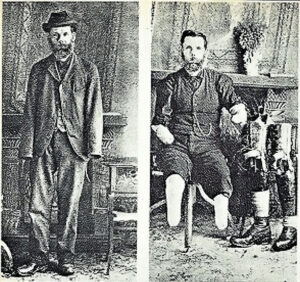Finlay Booth. What better way to start off our new era than with a story of hope and inspiration. A local resident brought to our attention the story of one of our local history’s many ‘notable people’, Finlay Booth. As you will see from these photos from the History of the R.M. of Dufferin, 1880-1980, Booth was what we now would call “disabled”.
Back in the days when health care was a thing of the future in the Boyne Settlement and the nearest medical practitioners were in Winnipeg, Finlay Booth demonstrated the remarkable resilience and will of many of our early settlers as he learned to overcome his physical challenges.
In 1871, the Booth family joined the westward trek from Ontario to the claim homestead land in the newly formed Province of Manitoba. They left Winnipeg in November of that year, overnighting in Headingly before making their way southward along the Missouri Trail to the new Boyne Settlement. The family of seven travelled in a cart and rig with seventeen-year-old Finlay herding the family cow. Their second day on the Trail, the bright, sunny skies suddenly clouded over and the Booths found themselves in the midst of a raging prairie blizzard. Finlay became separated from the family and spent the night sheltered in a small thicket. When he finally arrived at the family cabin next day, his hands, feet and parts of his face were badly frozen. A physician was brought in from Winnipeg. After a valiant attempt to endure the pain, Finlay finally agreed to amputation of both hands and feet. His face also was disfigured.
Rather than remain dependent, Finlay determined to regain as much function as possible. Over the ensuing years, he learned how to mount and ride a horse and became employed herding cattle. He made adaptations that allowed him to shoot and learned how to perform such fine tasks as making change and threading a needle. Finlay saved his earnings from herding and purchased protheses. As these wore out and had to be replaced, Finlay was faced with selling his own herd of cattle to pay for replacements. The R.M. of Dufferin Council recognized this remarkable man’s achievements by giving him the funds, no strings attached, to pay for the protheses. For more information on Finlay Booth’s family, his ordeal and accomplishments, see:
The History of the R.M. of Dufferin, 1880-1980, pp. 345-8; available online.
Rev. Hamilton Wigle from Winnipeg also interviewed Finlay Booth and told his story in a temperance treatise titled: The Life Story of Finlay Booth, available online.

